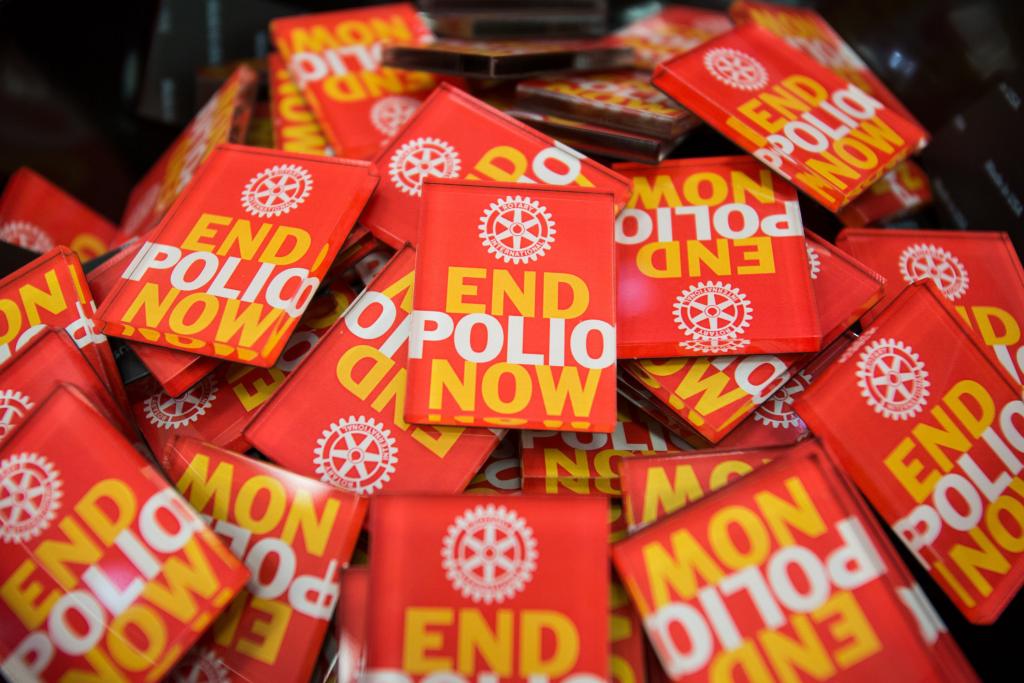In advance of World Polio Day on 24 October 2018, a physical and online event providing a briefing for the world’s press and others, held on 22 October, was entitled ‘The global effort to eradicate polio: is it time to stop?’
It is inevitable that there are questions about the effort needed to complete polio eradication at this stage. 2018 marks the 30th anniversary of the start of the Global Polio Eradication Initiative (GPEI), which was mandated by the World Health Assembly in 1988 following a campaign spearheaded by Rotary International. Very great progress has been made, with the number of cases of paralysis caused by the wild polio virus (WPV) having fallen from around 350,000 per year, occurring in 125 countries, in the mid-1980s to 22 cases, occurring only in Afghanistan and Pakistan, in 2017. But the original target date for eradication in 2000 and several subsequent targets have been missed. In 2018, there have been 20 cases so far, again all in Afghanistan (16) and Pakistan (4), while Nigeria is still classed as an endemic country, having seen a brief renewed outbreak in Borno State in 2016. The continuing efforts to gain access to every child in the insecure areas of the three remaining endemic countries, to ensure complete vaccination against polio, are very expensive, requiring hundreds of millions of dollars a year and demanding the time of tens of thousands of vaccinators, managers, health service personnel and volunteer fundraisers.
However, the emphatic answer coming from the speakers was a resounding ‘NO’. They concluded that we are too close to polio eradication to turn back, and that the health and financial benefits of eradication are too compelling to abandon.
Key reasons why the polio eradication effort must not be ended until it has been successfully completed included:
- Value to humanity: the global public good of ending an infectious disease in human beings for only the second time in history, saving lives and preventing lifelong disability, is immensely valuable. Success will mark one of humanity’s greatest achievements, while Michel Zaffran asked “What will the next generation say if we are 12 cases away from eradicating polio forever and we allow the disease to escape?”
- The cost-benefit case for eradication is clear: The benefits of polio eradication are huge, while the costs of failure will rapidly rise to very substantial levels. WHO has estimated that, if the eradication programme was terminated before complete interruption of WPV, the number of cases could rise to about 200,000 globally within 10 years, with consequent costs in terms of lives lost and disability created and entailing treatment costs and losses of productivity. The economic benefits of global polio eradication are projected to exceed US$ 40-50 billion.
The difficulties still to be overcome in achieving the goal of polio eradication must not be underestimated. They include the immense challenges encountered in gaining access for polio vaccinators to every child, including in some highly insecure areas; overcoming the resistance of some parents, communities and religious leaders to vaccinations; and ensuring that a sufficiently strong and long-term commitment to vaccination provides the necessary level of confidence for the major investments needed in the production of oral and injectable vaccines and enabling the eventually complete global switch from the former to the latter (necessary to eliminate the rare, vaccine-derived polio infections that can result from the live, attenuated virus in the oral vaccine but not from the fully inactivated virus in the injectable vaccine). And all of this requires a great deal of money and the maintenance of a global effort employing many thousands of paid and volunteer workers.
The conclusion is clear: At this very late stage in the end-game of polio eradication, the world cannot afford to falter. Political will is essential, to continue committing the human and financial resources necessary. There is no sensible alternative.
Judith Diment is a member of Rotary International PolioPlus Committee, Coordinator of Rotary International Advocacy Task Force and Rotary Representative to the Commonwealth of Nations.
Stephen A. Matlin is a Senior Fellow in the Global Health Centre (GHC), Graduate Institute of International and Development Studies, Geneva; and co-investigator with Michaela Told (Executive Director, GHC) of a project on polio eradication and transitioning funded by the Bill and Melinda Gates Foundation.
Photo © Rotary International


